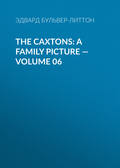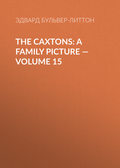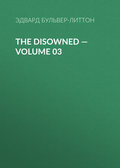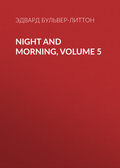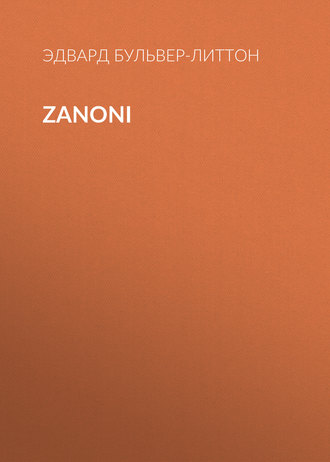
Эдвард Бульвер-Литтон
Zanoni
Thus days and weeks rolled on; and the mind of Glyndon, gradually fitted to this sequestered and musing life, forgot at last the vanities and chimeras of the world without.
One evening he had lingered alone and late upon the ramparts, watching the stars as, one by one, they broke upon the twilight. Never had he felt so sensibly the mighty power of the heavens and the earth upon man; how much the springs of our intellectual being are moved and acted upon by the solemn influences of Nature. As a patient on whom, slowly and by degrees, the agencies of mesmerism are brought to bear, he acknowledged to his heart the growing force of that vast and universal magnetism which is the life of creation, and binds the atom to the whole. A strange and ineffable consciousness of power, of the SOMETHING GREAT within the perishable clay, appealed to feelings at once dim and glorious,—like the faint recognitions of a holier and former being. An impulse, that he could not resist, led him to seek the mystic. He would demand, that hour, his initiation into the worlds beyond our world,—he was prepared to breathe a diviner air. He entered the castle, and strode the shadowy and starlit gallery which conducted to Mejnour’s apartment.
CHAPTER 4.III
Man is the eye of things.—Euryph, “de Vit. Hum.”
…There is, therefore, a certain ecstatical or transporting power, which, if at any time it shall be excited or stirred up by an ardent desire and most strong imagination, is able to conduct the spirit of the more outward even to some absent and far-distant object.—Von Helmont.
The rooms that Mejnour occupied consisted of two chambers communicating with each other, and a third in which he slept. All these rooms were placed in the huge square tower that beetled over the dark and bush-grown precipice. The first chamber which Glyndon entered was empty. With a noiseless step he passed on, and opened the door that admitted into the inner one. He drew back at the threshold, overpowered by a strong fragrance which filled the chamber: a kind of mist thickened the air rather than obscured it, for this vapour was not dark, but resembled a snow-cloud moving slowly, and in heavy undulations, wave upon wave regularly over the space. A mortal cold struck to the Englishman’s heart, and his blood froze. He stood rooted to the spot; and as his eyes strained involuntarily through the vapour, he fancied (for he could not be sure that it was not the trick of his imagination) that he saw dim, spectre-like, but gigantic forms floating through the mist; or was it not rather the mist itself that formed its vapours fantastically into those moving, impalpable, and bodiless apparitions? A great painter of antiquity is said, in a picture of Hades, to have represented the monsters that glide through the ghostly River of the Dead, so artfully, that the eye perceived at once that the river itself was but a spectre, and the bloodless things that tenanted it had no life, their forms blending with the dead waters till, as the eye continued to gaze, it ceased to discern them from the preternatural element they were supposed to inhabit. Such were the moving outlines that coiled and floated through the mist; but before Glyndon had even drawn breath in this atmosphere—for his life itself seemed arrested or changed into a kind of horrid trance—he felt his hand seized, and he was led from that room into the outer one. He heard the door close,—his blood rushed again through his veins, and he saw Mejnour by his side. Strong convulsions then suddenly seized his whole frame,—he fell to the ground insensible. When he recovered, he found himself in the open air in a rude balcony of stone that jutted from the chamber, the stars shining serenely over the dark abyss below, and resting calmly upon the face of the mystic, who stood beside him with folded arms.
“Young man,” said Mejnour, “judge by what you have just felt, how dangerous it is to seek knowledge until prepared to receive it. Another moment in the air of that chamber and you had been a corpse.”
“Then of what nature was the knowledge that you, once mortal like myself, could safely have sought in that icy atmosphere, which it was death for me to breathe? Mejnour,” continued Glyndon, and his wild desire, sharpened by the very danger he had passed, once more animated and nerved him, “I am prepared at least for the first steps. I come to you as of old the pupil to the Hierophant, and demand the initiation.”
Mejnour passed his hand over the young man’s heart,—it beat loud, regularly, and boldly. He looked at him with something almost like admiration in his passionless and frigid features, and muttered, half to himself, “Surely, in so much courage the true disciple is found at last.” Then, speaking aloud, he added, “Be it so; man’s first initiation is in TRANCE. In dreams commences all human knowledge; in dreams hovers over measureless space the first faint bridge between spirit and spirit,—this world and the worlds beyond! Look steadfastly on yonder star!”
Glyndon obeyed, and Mejnour retired into the chamber, from which there then slowly emerged a vapour, somewhat paler and of fainter odour than that which had nearly produced so fatal an effect on his frame. This, on the contrary, as it coiled around him, and then melted in thin spires into the air, breathed a refreshing and healthful fragrance. He still kept his eyes on the star, and the star seemed gradually to fix and command his gaze. A sort of languor next seized his frame, but without, as he thought, communicating itself to the mind; and as this crept over him, he felt his temples sprinkled with some volatile and fiery essence. At the same moment a slight tremor shook his limbs and thrilled through his veins. The languor increased, still he kept his gaze upon the star, and now its luminous circumference seemed to expand and dilate. It became gradually softer and clearer in its light; spreading wider and broader, it diffused all space,—all space seemed swallowed up in it. And at last, in the midst of a silver shining atmosphere, he felt as if something burst within his brain,—as if a strong chain were broken; and at that moment a sense of heavenly liberty, of unutterable delight, of freedom from the body, of birdlike lightness, seemed to float him into the space itself. “Whom, now upon earth, dost thou wish to see?” whispered the voice of Mejnour. “Viola and Zanoni!” answered Glyndon, in his heart; but he felt that his lips moved not.
Suddenly at that thought,—through this space, in which nothing save one mellow translucent light had been discernible,—a swift succession of shadowy landscapes seemed to roll: trees, mountains, cities, seas, glided along like the changes of a phantasmagoria; and at last, settled and stationary, he saw a cave by the gradual marge of an ocean shore,—myrtles and orange-trees clothing the gentle banks. On a height, at a distance, gleamed the white but shattered relics of some ruined heathen edifice; and the moon, in calm splendour, shining over all, literally bathed with its light two forms without the cave, at whose feet the blue waters crept, and he thought that he even heard them murmur. He recognised both the figures. Zanoni was seated on a fragment of stone; Viola, half-reclining by his side, was looking into his face, which was bent down to her, and in her countenance was the expression of that perfect happiness which belongs to perfect love. “Wouldst thou hear them speak?” whispered Mejnour; and again, without sound, Glyndon inly answered, “Yes!” Their voices then came to his ear, but in tones that seemed to him strange; so subdued were they, and sounding, as it were, so far off, that they were as voices heard in the visions of some holier men from a distant sphere.
“And how is it,” said Viola, “that thou canst find pleasure in listening to the ignorant?”
“Because the heart is never ignorant; because the mysteries of the feelings are as full of wonder as those of the intellect. If at times thou canst not comprehend the language of my thoughts, at times also I hear sweet enigmas in that of thy emotions.”
“Ah, say not so!” said Viola, winding her arm tenderly round his neck, and under that heavenly light her face seemed lovelier for its blushes. “For the enigmas are but love’s common language, and love should solve them. Till I knew thee,—till I lived with thee; till I learned to watch for thy footstep when absent: yet even in absence to see thee everywhere!—I dreamed not how strong and all-pervading is the connection between nature and the human soul!…
“And yet,” she continued, “I am now assured of what I at first believed,—that the feelings which attracted me towards thee at first were not those of love. I know THAT, by comparing the present with the past,—it was a sentiment then wholly of the mind or the spirit! I could not hear thee now say, ‘Viola, be happy with another!’”
“And I could not now tell thee so! Ah, Viola, never be weary of assuring me that thou art happy!”
“Happy while thou art so. Yet at times, Zanoni, thou art so sad!”
“Because human life is so short; because we must part at last; because yon moon shines on when the nightingale sings to it no more! A little while, and thine eyes will grow dim, and thy beauty haggard, and these locks that I toy with now will be grey and loveless.”
“And thou, cruel one!” said Viola, touchingly, “I shall never see the signs of age in thee! But shall we not grow old together, and our eyes be accustomed to a change which the heart shall not share!”
Zanoni sighed. He turned away, and seemed to commune with himself.
Glyndon’s attention grew yet more earnest.
“But were it so,” muttered Zanoni; and then looking steadfastly at Viola, he said, with a half-smile, “Hast thou no curiosity to learn more of the lover thou once couldst believe the agent of the Evil One?”
“None; all that one wishes to know of the beloved one, I know—THAT THOU LOVEST ME!”
“I have told thee that my life is apart from others. Wouldst thou not seek to share it?”
“I share it now!”
“But were it possible to be thus young and fair forever, till the world blazes round us as one funeral pyre!”
“We shall be so, when we leave the world!”
Zanoni was mute for some moments, and at length he said,—
“Canst thou recall those brilliant and aerial dreams which once visited thee, when thou didst fancy that thou wert preordained to some fate aloof and afar from the common children of the earth?”
“Zanoni, the fate is found.”
“And hast thou no terror of the future?”
“The future! I forget it! Time past and present and to come reposes in thy smile. Ah, Zanoni, play not with the foolish credulities of my youth! I have been better and humbler since thy presence has dispelled the mist of the air. The future!—well, when I have cause to dread it, I will look up to heaven, and remember who guides our fate!”
As she lifted her eyes above, a dark cloud swept suddenly over the scene. It wrapped the orange-trees, the azure ocean, the dense sands; but still the last images that it veiled from the charmed eyes of Glyndon were the forms of Viola and Zanoni. The face of the one rapt, serene, and radiant; the face of the other, dark, thoughtful, and locked in more than its usual rigidness of melancholy beauty and profound repose.
“Rouse thyself,” said Mejnour; “thy ordeal has commenced! There are pretenders to the solemn science who could have shown thee the absent, and prated to thee, in their charlatanic jargon, of the secret electricities and the magnetic fluid of whose true properties they know but the germs and elements. I will lend thee the books of those glorious dupes, and thou wilt find, in the dark ages, how many erring steps have stumbled upon the threshold of the mighty learning, and fancied they had pierced the temple. Hermes and Albert and Paracelsus, I knew ye all; but, noble as ye were, ye were fated to be deceived. Ye had not souls of faith, and daring fitted for the destinies at which ye aimed! Yet Paracelsus—modest Paracelsus—had an arrogance that soared higher than all our knowledge. Ho, ho!—he thought he could make a race of men from chemistry; he arrogated to himself the Divine gift,—the breath of life. (Paracelsus, ‘De Nat. Rer.,’ lib. i.)
“He would have made men, and, after all, confessed that they could be but pygmies! My art is to make men above mankind. But you are impatient of my digressions. Forgive me. All these men (they were great dreamers, as you desire to be) were intimate friends of mine. But they are dead and rotten. They talked of spirits,—but they dreaded to be in other company than that of men. Like orators whom I have heard, when I stood by the Pnyx of Athens, blazing with words like comets in the assembly, and extinguishing their ardour like holiday rockets when they were in the field. Ho, ho! Demosthenes, my hero-coward, how nimble were thy heels at Chaeronea! And thou art impatient still! Boy, I could tell thee such truths of the past as would make thee the luminary of schools. But thou lustest only for the shadows of the future. Thou shalt have thy wish. But the mind must be first exercised and trained. Go to thy room, and sleep; fast austerely, read no books; meditate, imagine, dream, bewilder thyself if thou wilt. Thought shapes out its own chaos at last. Before midnight, seek me again!”
CHAPTER 4.IV
It is fit that we who endeavour to rise to an elevation so sublime, should study first to leave behind carnal affections, the frailty of the senses, the passions that belong to matter; secondly, to learn by what means we may ascend to the climax of pure intellect, united with the powers above, without which never can we gain the lore of secret things, nor the magic that effects true wonders.—Tritemius “On Secret Things and Secret Spirits.”
It wanted still many minutes of midnight, and Glyndon was once more in the apartment of the mystic. He had rigidly observed the fast ordained to him; and in the rapt and intense reveries into which his excited fancy had plunged him, he was not only insensible to the wants of the flesh,—he felt above them.
Mejnour, seated beside his disciple, thus addressed him:—
“Man is arrogant in proportion to his ignorance. Man’s natural tendency is to egotism. Man, in his infancy of knowledge, thinks that all creation was formed for him. For several ages he saw in the countless worlds that sparkle through space like the bubbles of a shoreless ocean only the petty candles, the household torches, that Providence had been pleased to light for no other purpose but to make the night more agreeable to man. Astronomy has corrected this delusion of human vanity; and man now reluctantly confesses that the stars are worlds larger and more glorious than his own,—that the earth on which he crawls is a scarce visible speck on the vast chart of creation. But in the small as in the vast, God is equally profuse of life. The traveller looks upon the tree, and fancies its boughs were formed for his shelter in the summer sun, or his fuel in the winter frosts. But in each leaf of these boughs the Creator has made a world; it swarms with innumerable races. Each drop of the water in yon moat is an orb more populous than a kingdom is of men. Everywhere, then, in this immense design, science brings new life to light. Life is the one pervading principle, and even the thing that seems to die and putrify but engenders new life, and changes to fresh forms of matter. Reasoning, then, by evident analogy: if not a leaf, if not a drop of water, but is, no less than yonder star, a habitable and breathing world,—nay, if even man himself is a world to other lives, and millions and myriads dwell in the rivers of his blood, and inhabit man’s frame as man inhabits earth, commonsense (if your schoolmen had it) would suffice to teach that the circumfluent infinite which you call space—the countless Impalpable which divides earth from the moon and stars—is filled also with its correspondent and appropriate life. Is it not a visible absurdity to suppose that being is crowded upon every leaf, and yet absent from the immensities of space? The law of the Great System forbids the waste even of an atom; it knows no spot where something of life does not breathe. In the very charnel-house is the nursery of production and animation. Is that true? Well, then, can you conceive that space, which is the Infinite itself, is alone a waste, is alone lifeless, is less useful to the one design of universal being than the dead carcass of a dog, than the peopled leaf, than the swarming globule? The microscope shows you the creatures on the leaf; no mechanical tube is yet invented to discover the nobler and more gifted things that hover in the illimitable air. Yet between these last and man is a mysterious and terrible affinity. And hence, by tales and legends, not wholly false nor wholly true, have arisen from time to time, beliefs in apparitions and spectres. If more common to the earlier and simpler tribes than to the men of your duller age, it is but that, with the first, the senses are more keen and quick. And as the savage can see or scent miles away the traces of a foe, invisible to the gross sense of the civilised animal, so the barrier itself between him and the creatures of the airy world is less thickened and obscured. Do you listen?”
“With my soul!”
“But first, to penetrate this barrier, the soul with which you listen must be sharpened by intense enthusiasm, purified from all earthlier desires. Not without reason have the so-styled magicians, in all lands and times, insisted on chastity and abstemious reverie as the communicants of inspiration. When thus prepared, science can be brought to aid it; the sight itself may be rendered more subtle, the nerves more acute, the spirit more alive and outward, and the element itself—the air, the space—may be made, by certain secrets of the higher chemistry, more palpable and clear. And this, too, is not magic, as the credulous call it; as I have so often said before, magic (or science that violates Nature) exists not: it is but the science by which Nature can be controlled. Now, in space there are millions of beings not literally spiritual, for they have all, like the animalculae unseen by the naked eye, certain forms of matter, though matter so delicate, air-drawn, and subtle, that it is, as it were, but a film, a gossamer that clothes the spirit. Hence the Rosicrucian’s lovely phantoms of sylph and gnome. Yet, in truth, these races and tribes differ more widely, each from each, than the Calmuc from the Greek,—differ in attributes and powers. In the drop of water you see how the animalculae vary, how vast and terrible are some of those monster mites as compared with others. Equally so with the inhabitants of the atmosphere: some of surpassing wisdom, some of horrible malignity; some hostile as fiends to men, others gentle as messengers between earth and heaven.
“He who would establish intercourse with these varying beings resembles the traveller who would penetrate into unknown lands. He is exposed to strange dangers and unconjectured terrors. THAT INTERCOURSE ONCE GAINED, I CANNOT SECURE THEE FROM THE CHANCES TO WHICH THY JOURNEY IS EXPOSED. I cannot direct thee to paths free from the wanderings of the deadliest foes. Thou must alone, and of thyself, face and hazard all. But if thou art so enamoured of life as to care only to live on, no matter for what ends, recruiting the nerves and veins with the alchemist’s vivifying elixir, why seek these dangers from the intermediate tribes? Because the very elixir that pours a more glorious life into the frame, so sharpens the senses that those larvae of the air become to thee audible and apparent; so that, unless trained by degrees to endure the phantoms and subdue their malice, a life thus gifted would be the most awful doom man could bring upon himself. Hence it is, that though the elixir be compounded of the simplest herbs, his frame only is prepared to receive it who has gone through the subtlest trials. Nay, some, scared and daunted into the most intolerable horror by the sights that burst upon their eyes at the first draft, have found the potion less powerful to save than the agony and travail of Nature to destroy. To the unprepared the elixir is thus but the deadliest poison. Amidst the dwellers of the threshold is ONE, too, surpassing in malignity and hatred all her tribe,—one whose eyes have paralyzed the bravest, and whose power increases over the spirit precisely in proportion to its fear. Does thy courage falter?”
“Nay; thy words but kindle it.”
“Follow me, then, and submit to the initiatory labours.”
With that, Mejnour led him into the interior chamber, and proceeded to explain to him certain chemical operations which, though extremely simple in themselves, Glyndon soon perceived were capable of very extraordinary results.
“In the remoter times,” said Mejnour, smiling, “our brotherhood were often compelled to recur to delusions to protect realities; and, as dexterous mechanicians or expert chemists, they obtained the name of sorcerers. Observe how easy to construct is the Spectre Lion that attended the renowned Leonardo da Vinci!”
And Glyndon beheld with delighted surprise the simple means by which the wildest cheats of the imagination can be formed. The magical landscapes in which Baptista Porta rejoiced; the apparent change of the seasons with which Albertus Magnus startled the Earl of Holland; nay, even those more dread delusions of the Ghost and Image with which the necromancers of Heraclea woke the conscience of the conqueror of Plataea (Pausanias,—see Plutarch.),—all these, as the showman enchants some trembling children on a Christmas Eve with his lantern and phantasmagoria, Mejnour exhibited to his pupil.
....
“And now laugh forever at magic! when these, the very tricks, the very sports and frivolities of science, were the very acts which men viewed with abhorrence, and inquisitors and kings rewarded with the rack and the stake.”
“But the alchemist’s transmutation of metals—”
“Nature herself is a laboratory in which metals, and all elements, are forever at change. Easy to make gold,—easier, more commodious, and cheaper still, to make the pearl, the diamond, and the ruby. Oh, yes; wise men found sorcery in this too; but they found no sorcery in the discovery that by the simplest combination of things of every-day use they could raise a devil that would sweep away thousands of their kind by the breath of consuming fire. Discover what will destroy life, and you are a great man!—what will prolong it, and you are an imposter! Discover some invention in machinery that will make the rich more rich and the poor more poor, and they will build you a statue! Discover some mystery in art that will equalise physical disparities, and they will pull down their own houses to stone you! Ha, ha, my pupil! such is the world Zanoni still cares for!—you and I will leave this world to itself. And now that you have seen some few of the effects of science, begin to learn its grammar.”
Mejnour then set before his pupil certain tasks, in which the rest of the night wore itself away.



